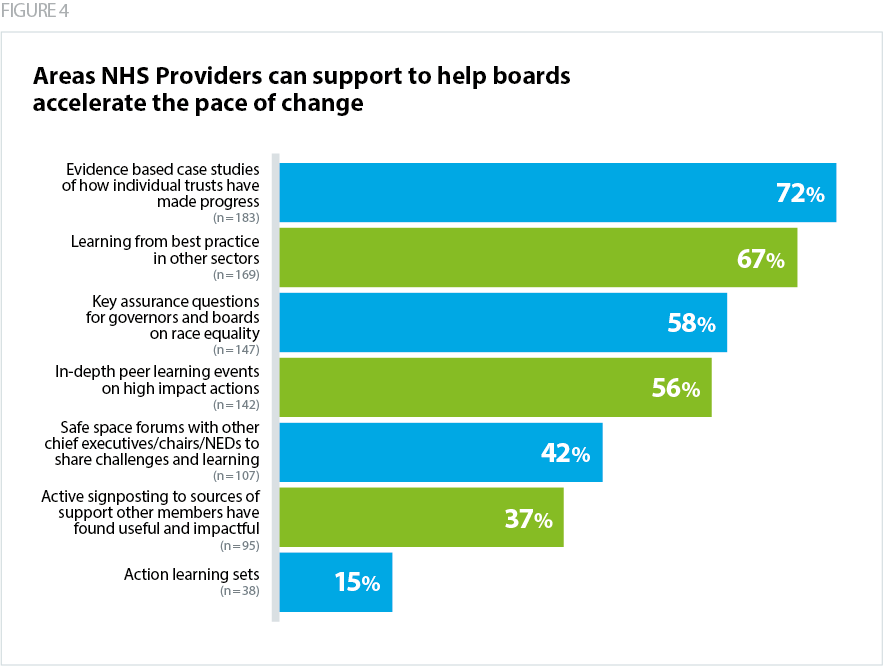Perceptions of NHS Providers
We felt it was important to ask respondents about their perception of NHS Providers, particularly as we are on a similar journey to that of our members and invested in making improvements towards becoming an anti-racist organisation. NHS Providers was described by some as "late to the party". Some leaders highlighted the lack of diversity among staff at NHS Providers, particularly at a senior level. There was also a perception that there was little diversity in people leading and facilitating NHS Provider events. One leader was "yet to see an NHS Providers session run by a black individual."
I'd like to see you speaking up too on this agenda.
Combined mental health, learning disability and community trust
Will NHS Providers be appropriately challenging to individual trusts – and how they think, understand, and most importantly ACT to address this agenda? How is NHS Providers going to change hearts and minds in a way that leads to action?
Some members felt NHS Providers was not in a confident position to talk about race, with one commenting that we have been "caught in the headlights, as have all other white leaders". It was felt that we needed to "be more comfortable having uncomfortable conversations and asking the questions [about race]". Others describe having to "dig a long way on the website before you find anything on inclusion". Some members notice the lack of conversation and engagement when race is mentioned at member meetings in comparison to other topics.
Support needs
We asked leaders what support they needed from NHS Providers to help their boards accelerate the pace of change on race equality. Almost three out of four respondents (72%) said that evidence-based case studies of how individual trusts have made progress would help their board, followed by two thirds (67%) who wanted to learn from best practice in other sectors. A majority of respondents thought key assurance questions on race equality would be helpful and in-depth peer learning events on high impact actions.

Evidenced based best practice, in depth peer learning
Leaders would like NHS Providers to share best practice and provide a platform for members to learn from each other as well as other sectors. Members stressed the need for a body to promote what good looks like from commissioning and planning through to intervention and impact. Effective signposting to the work of other organisations and available resources was also a key theme.
Some felt NHS Providers should provide advice on the most impactful actions to tackle race inequality. For others, the NHS Provider value-add was seen more in our convening and peer learning role, including facilitating access to board members who already lead on the race agenda who can act as mentors.
One of the key areas where leaders would like support is help understanding the data, particularly as a way of making the case for change. This ranged from a basic understanding of disaggregated data on ethnicity to using intersectional data and combining quantitative data with lived experience testimony. Some leaders felt boards are not good at knowing what to do with WRES data and NHS Providers could help share good practice. Trusts would also like help understanding the variation of ethnic minority populations across the country. Effective use of data and digital approaches was highlighted by some as a specific area of support.
An awareness that not one size fits all led many leaders to suggest NHS Providers has a role to play in sharing solutions to tackling race inequality tailored to very specific contexts. This included sharing case studies of organisations with different types of staff and population profiles.
Some leaders would find it useful for NHS Providers to create materials around the case for culture change that could be delivered by them as well as by NHS Providers via one off board sessions. A few leaders called for mid to long-term tailor-made development programmes including for specific subsets of leadership such as governors, chairs and HR professionals.
Accountability and challenge
Sharing good practice about how boards have incorporated accountability for tackling race equality into their existing ways of working is a key area where leaders have asked for support. Areas of challenge for leaders include developing effective accountability frameworks, encouraging accountability through personal development plans and understanding how change gets embedded right through an organisation.
Trusts felt NHS Providers could make more use of its agency and influencing, challenging national bodies and regulators to ensure race equality is genuinely prioritised. Similarly, NHS Providers could challenge white chairs and chief executives to have conversations about race, helping to develop a greater understanding of what it means to be anti-racist and the chair/chief executive role in leading the EDI agenda more widely.
...the perpetual reinforcement that this “isn’t somebody else’s job, this is your job” could be very
powerful.
Collaborative working and networks
There was a unanimous feeling that it is important to support and engage with other organisations and their work on race equality, and that NHS Providers could help embed this focus through our existing support offer, including their networks, board development and induction programmes. More specifically we could help members understand how other trusts have embedded values around race equality and make sense of wider work on race equality by facilitating allyship with organisations like the Leadership Academy, Seacole Group, Race and Health Observatory and NHS WRES, and working with them to develop a diverse pool of speakers and trainers.
Safe spaces
The importance of creating safe spaces emerged as an overarching theme across all areas of potential support. There is a recognition that people are concerned about exposing their vulnerabilities. NHS Providers was seen to have a key role in creating safe opportunities to have difficult conversations that build confidence and trust and enable people to open up. We can build and sustain allyship and define the function and responsibilities of safe spaces within our various networks, for example, building a forum/network for chairs specific to race equality.